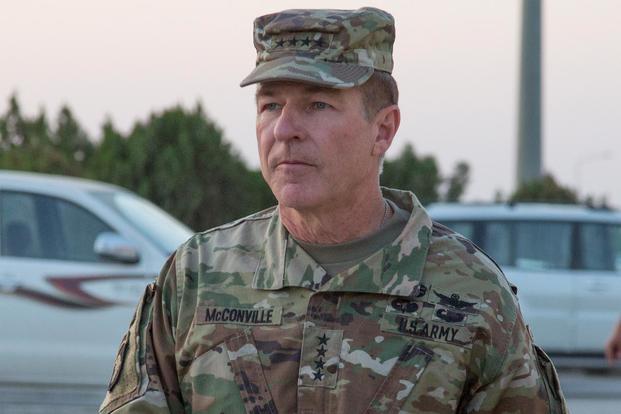The U.S. Army's vice chief of staff said Monday the service must find new ways to diversify its ranks, which currently consist mostly of individuals from military families.
Gen. James McConville, who has three children serving in the U.S. military, said there are benefits to having senior commissioned and non-commissioned officers with children serving in the force.
"We always keep that in the back of our minds -- this is someone's son or daughter that we are sending into combat," McConville told an audience at the Future of War 2018 conference sponsored by New America and Arizona State University.
"Having said that, 79 percent of people that come into the Army have a family member that served in the military, and we want to open that up," he said. "We don't want to become isolated. ... I think it is very, very important that we represent the total diversity of the United States of America."
McConville also stressed that "only 29 percent of American youth are qualified to come into the military" because they fail to meet certain physical, mental and moral standards required for service.
The Army has to compete against the other services as well as the private sector for that 29 percent, he said.
"We need to expose the Army more to people. There is a reason why kids of military officers and NCOs go into the Army -- because they know it," McConville said.
"I grew up in Boston. There was very little military around. We had a few kids in the neighborhood go in the service, mainly because their dads were enlisted during the Korean War or during World War II. ... So we are trying to open up the aperture," he said. "We don't want to be a family business or a military business because we want to give everyone the opportunity to serve."
The Army is also changing the way it attracts and manages talent, McConville said.
"We are doing a lot in talent management," he said. "We are actually changing our personnel system to a talent management system."
Currently, the Army has an industrial-age system that manages people by "two variables -- you are a captain of infantry or you are a sergeant of engineers. And we have three different personnel systems for National Guard, for Reserve and for our Active," McConville said.
"We recognize that and, as we go into the future, we want a system that is going to manage each person's individual talents. Rather than you be defined by two variables, we are going to define you by 25 variables," he said, without elaborating on those 25 variables.
"We are going to credential you in a way that you are a person of cyber that has this skill level. We can bring you into the Army, we can allow you to serve, we can promote you based on that skill level and not necessarily how many combat tours you have or how many live-fire events you have done because we recognize in the future we are going need different types of people in the Army," he said.
-- Matthew Cox can be reached at matthew.cox@military.com.











